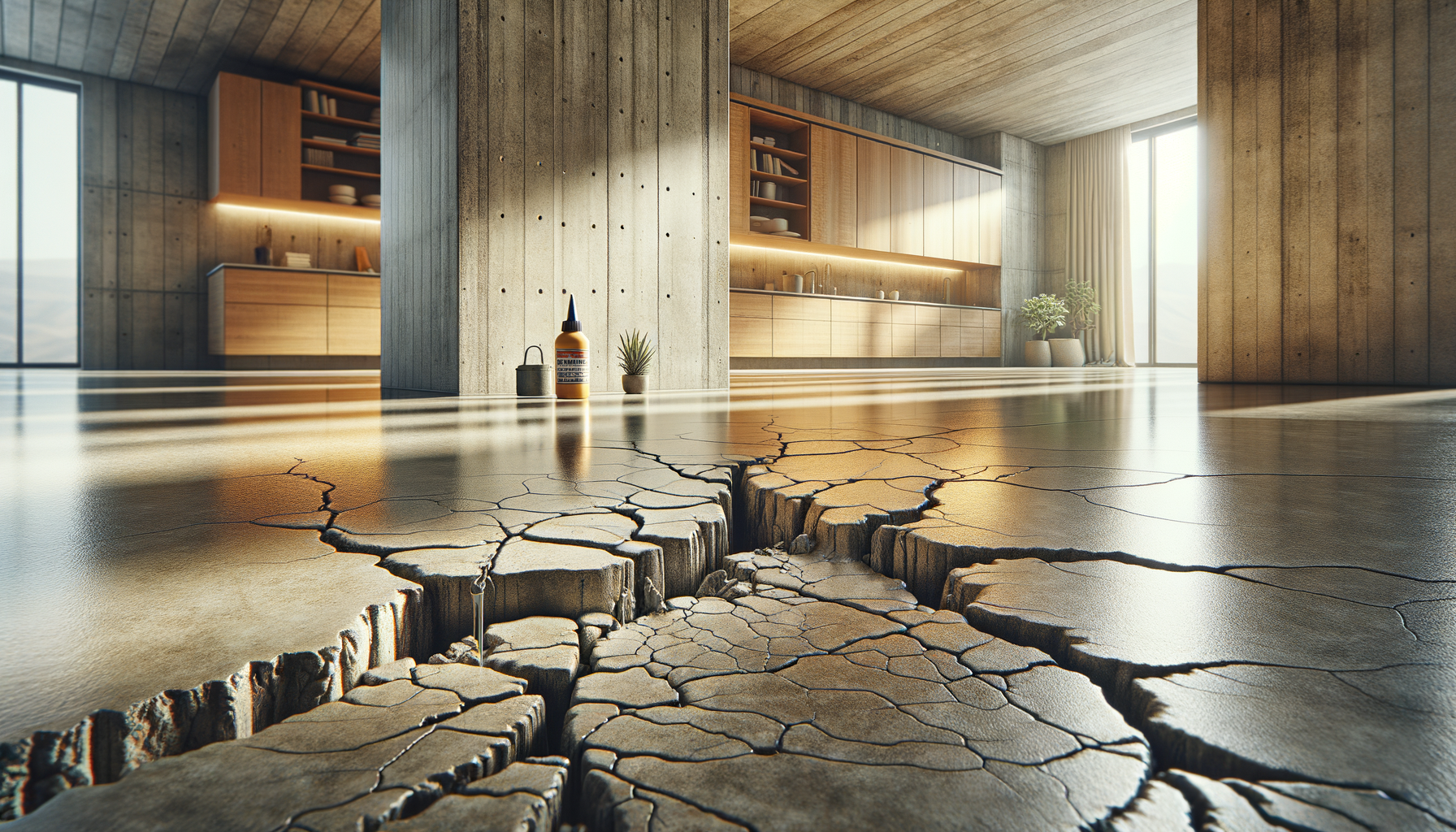Having cracks in your concrete floor can be upsetting, but if you know why they happen and how to fix them, it’s not as scary. Here’s a simple guide to help you understand what’s going on with your concrete floor and what you can do about it.
Why Do Concrete Floors Crack?
Knowing why your concrete floor has cracks can help you fix them better. Here are some common reasons:
- Shrinkage: When concrete dries, it shrinks. This can cause small cracks on the surface.
- Settling: The ground underneath the concrete can move or settle over time, which can make the concrete crack.
- Temperature Changes: Hot and cold weather can make concrete expand and contract, causing cracks.
- Heavy Loads: Heavy things like cars or machinery can put pressure on the concrete and make it crack.
- Poor Installation: If the concrete wasn’t mixed or installed properly, it might crack more easily.
Different Kinds of Concrete Floor Cracks
There are different types of cracks, and they need different fixes. Here are some common ones:
- Hairline Cracks: Very thin cracks, usually less than 1/8 inch wide, often due to shrinkage.
- Shrinkage Cracks: These happen as the concrete dries and are usually not very deep.
- Settlement Cracks: These occur when the ground moves, causing the concrete to crack.
- Structural Cracks: Serious cracks that can affect the stability of your home.
- Heaving Cracks: Caused by the soil underneath expanding and contracting, often due to changes in moisture.
Signs You Have Concrete Floor Cracks
Spotting cracks early can save you from bigger problems later. Look for these signs:
- Visible Lines: Any visible lines on the floor, whether thin or wide, mean there’s a crack.
- Uneven Surfaces: Raised or sunken areas can indicate cracks below.
- Water Seepage: If you see water or damp areas near cracks, it means water is getting through.
- Staining or Discoloration: Changes in color might be due to cracks letting in dirt or water.
- Sound Changes: A hollow sound when you tap the floor could mean there are cracks or empty spaces beneath.
How to Prevent Concrete Floor Cracks
You can’t always stop cracks from forming, but these tips can help:
- Proper Curing: Keep the concrete moist while it’s curing.
- Quality Materials: Use good quality concrete and install it correctly.
- Control Joints: Adding control joints can help guide where the cracks happen.
- Ground Stabilization: Make sure the ground under the concrete is stable and well-packed.
- Regular Maintenance: Check your floors regularly and fix small issues right away.
Fixing Concrete Floor Cracks
Different cracks need different fixes. Here’s what you can do:
- Filling and Sealing: For small cracks, you can use filler or sealant from a home improvement store.
- Epoxy Injections: For bigger cracks, epoxy can help bond the concrete back together.
- Concrete Resurfacing: Adding a new layer on top can hide minor cracks and make the floor look new again.
- Professional Help: For large or serious cracks, call an expert.
- Preventive Measures Post-Repair: Make sure to fix drainage around your home and keep moisture levels stable to avoid new cracks.
Products for Repairing Concrete Floor Cracks
Using the right product can help fix cracks better:
- Concrete Crack Fillers: Good for minor cracks.
- Epoxy Kits: Stronger fix for bigger cracks.
- Polyurethane Sealants: Flexible and durable, good for cracks that might move a bit.
- Concrete Repair Mortars: Ideal for filling larger gaps.
- Grout: Used in big structural repairs.
When to Call a Professional
Sometimes you need more than DIY:
- Complex Cracks: Call an expert for unusual or complicated cracks.
- Signs of Structural Damage: If cracks are affecting your home’s foundation or structure.
- Recurring Issues: If the same cracks keep coming back.
- Large Cracks: If cracks are too big to handle on your own.
- Safety Concerns: Always prioritize safety.
FAQs About Concrete Floor Cracks
- Can all cracks be repaired? Most can be fixed, but how you fix them depends on the crack.
- Are some cracks harmless? Yes, hairline cracks from shrinkage usually aren’t a big deal.
- How long does a repair last? It depends on the method but can last many years with good care.
- Is ground movement always the cause? Not always, but it’s common. Bad installation and heavy loads can also cause cracks.
- Can I prevent cracks entirely? It’s hard to stop all cracks, but proper installation and maintenance help reduce them.
Final Tips for Homeowners
You can manage concrete floor cracks with the right approach. Here are some final tips:
- Regular Inspections: Keep checking your floors and catch cracks early.
- Early Action: Fix cracks as soon as you see them.
- Professional Assessments: Sometimes, a professional’s eye can spot big problems early.
- Long-Term Maintenance: Keep up with regular care to make your repairs last longer.
- Stay Informed: Learn about new products and techniques for maintaining your floors.
By understanding and fixing concrete floor cracks early, you can avoid bigger and more expensive repairs down the road. Whether you’re handling small cracks yourself or getting help for larger ones, knowing the cause and solution is key to keeping your home in good shape.


Leave a Reply